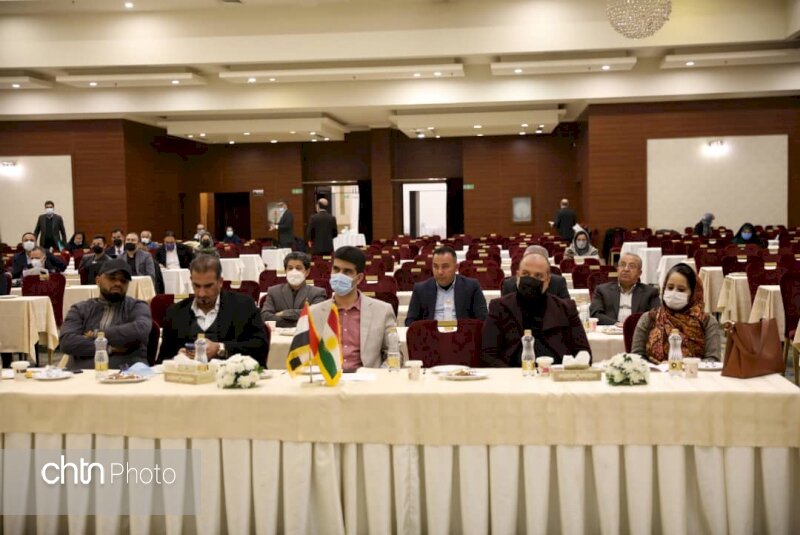
TEHRAN – On Friday, the Iranian capital hosted business-to-business (B2B) meetings between Iranian travel insiders and counterparts from Pakistan, Iraq, and Iraqi Kurdistan to promote reciprocal tourism.
Iran offers a variety of tourist attractions in the realms of historical, cultural, pilgrimage, and medical services, Iranian tourism activist Akbar Ghamkhar said during the meeting, CHTN reported.
Reasonable prices for incoming tours, hospitable people, and Halal food, as well as the possibility of obtaining easy visas and the accurate facilities in the field of air and land transportation, are among the factors motivating foreign tourists to visit Iran, he noted.
For his part, Tehran’s tourism chief Parham Janfeshan said that in terms of tourism, Tehran is an important province for the country, where Iran’s largest international airport, Imam Khomeini Airport, is the primary destination for foreign tourists is located.
“Tehran embraces many tourist attractions, including cultural, natural, and religious attractions, as well as facilities for health tourism,” he added.
Tehran has well-developed hotel accommodations and well-equipped recreation facilities, he mentioned.
Dusani Mohammed Hanif, a Pakistani travel expert said that Iran has a rich history and cultural tradition, and many efforts have been made in the last 40 years, despite cowardly sanctions.
He also expressed hope that such meetings could expand cooperation in the field of tourism development between the two countries.
In terms of religion and health tourism, Iraq and Iran have a lot in common, and the countries can reach good agreements on tourism development, said Iraqi tour operator Valid Zobeidi.
The ground is fertile for the Islamic Republic and its neighboring states to interact well for the development of tourism, despite the outbreak of coronavirus that disrupts the tourism market, he added.
Last week, Mehr reported that some 1.47m foreign nationals visited Iran from the beginning of the current Iranian calendar year (March 21, 2021) to January 1, a span most of which was subject to severe travel bans due to coronavirus.
Of the number, 635, 862 foreign nationals arrived in Iran as of mid-October when the Islamic Republic started issuance of tourist visas after a 20-month hiatus, the report added.
Citizens from Iraq and Afghanistan were the main source of tourism for Iran from October 23 to December 22, 2021.
Over the past couple of years, neighboring Iraq has been one of Iran’s most important markets for tourism and pilgrimage. Earlier this month, the deputy tourism chief Ali-Asghar Shalbafiana announced that Iran had renewed arrangements to facilitate travels for Iraqi nationals. “For Iraqi tourists visiting Iran, a new system has been implemented to ensure their safety and comfort.”
Last September, Cultural Heritage, Tourism and Handicrafts Minister Ezzatollah Zarghami announced that by the order of President Ebrahim Raisi the issuance of tourist visas and the flow of foreign tourists from land and air borders will be resumed from the month of Aban (Oct. 23 – Nov. 21) following 19 months of suspension.
Before the resumption, groups of Iranian tourism insiders urged the three ministries of interior, tourism, and foreign affairs to facilitate travel to Iran for foreign tourists from the mentioned countries who have obtained tourist visas and are en route to Iran or about to visit it. Also, some believed that preventing the spread of new variants of the virus and maintaining public health are preferable to the benefits of tourism.
Months of steep recession have taken its toll. Many travel insiders, hoteliers, and tour operators have faced big dilemmas such as bankruptcy, unemployment, debts, and the prospects of not being competitive on the international level. The pandemic has taken a huge toll on Iran’s civil aviation sector. For instance, airlines reportedly lost hundreds of millions of dollars because of flight cancellations during the busy New Year travel season last March.
Tourism authorities say Iran has the potential to experience a tourism boom after coronavirus is contained, believing its impact would be temporary and short-lived for a country that ranked the third fastest-growing tourism destination in 2019.
Iran is potentially a booming destination for travelers seeking cultural attractions, breathtaking sceneries, and numerous UNESCO-registered sites. Under the 2025 Tourism Vision Plan, Iran aims to increase the number of tourist arrivals from 4.8 million in 2014 to 20 million in 2025.

No comments:
Post a Comment